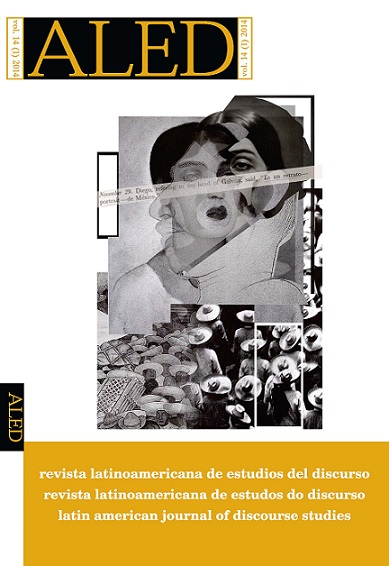El discurso de Carmen Clemente Travieso a la luz de las nociones de ideología y los enfoques feministas actuales sobre la comunicación
DOI:
https://doi.org/10.35956/v.14.n1.2014.p.43-57Keywords:
discourse. gender. feminist theory. feminist approaches. ideology.Abstract
Carmen Clemente Travieso (Caracas, 1900- 1983) was the first journalist woman in Venezuela, and is considered by many as the predecessor of the feminist movement in her country. This study focuses on fragments of six of her articles, written between 1936 and 1939. The main objective was to determine which approach to feminism better characterizes this journalist’s discourse. Four different approaches were compared: the “deficit approach”, the “dominance approach”, the “difference approach” and the “dynamic approach”. After careful analysis it is fair to conclude that Clemente Travieso’s discourse can be best explained within the framework of the dynamic approach. I support my appreciation on two facts: 1) she does not encourage women to imitate men but to liberate themselves from their own prejudices in order to become their equal, and 2) she considers men as victims of the “outdated” and “deformed” morals of Venezuela at that time. The second purpose of this work is to determine the ways in which van Dijk’s (2008) socio-cognitive criteria apply to the ideology reflected in Clemente Travieso’s texts.
Downloads
References
Archivo digital Carmen Clemente Travieso. Disponible en: http://cic1.ucab.edu.ve/cic/cctdigital/paginas/archivodigital.html
Aaron, J. (2004). The gendered use of salirse in Mexican Spanish: “Si me salía yo con las amigas, se enojaba”. Language in Society, 33: 585-607.
Cameron, D. (1992). Not the gender difference but the difference gender makes ”“ Explanation in research on sex and language. International Journal of the Sociology of Language, 94: 13 26.
ClementeTravieso, C. (1936). Nuestra mujer. Llamamiento. Orve. Disponible en: CICSVI Carmen Clemente Travieso, Sala Virtual de Investigación, http://cic1.ucab.edu.ve/cic/cctdigital/paginas/archivodigital.html
ClementeTravieso, C. (1938). Cultura femenina venezolana. Ahora. Disponible en: CICSVI Carmen Clemente Travieso, Sala Virtual de Investigación, http://cic1.ucab.edu.ve/cic/cctdigital/paginas/archivodigital.html
Clemente Travieso, C. (1939a). Incorporemos a la mujer a la vida ciudadana. Ahora. Disponible en: CICSVI Carmen Clemente Travieso, Sala Virtual de Investigación, http://cic1.ucab.edu.ve/cic/cctdigital/paginas/archivodigital.html
ClementeTravieso, C.(1939b). La mujer y la instrucción. Ahora. Disponible en: CICSVI Carmen Clemente Travieso, Sala Virtual de Investigación, http://cic1.ucab.edu.ve/cic/cctdigital/paginas/archivodigital.html
Clemente Travieso, C. (1939c). La capacidad intelectual de la mujer. Ahora. Disponible en: CICSVI Carmen Clemente Travieso, Sala Virtual de Investigación, http://cic1.ucab.edu.ve/cic/cctdigital/paginas/archivodigital.html
ClementeTravieso, C. (1939d). La mujer venezolana y su liberación económica. Ahora. Disponible en: CICSVI Carmen Clemente Travieso, Sala Virtual de Investigación, http://cic1.ucab.edu.ve/cic/cctdigital/paginas/archivodigital.html
Coates, J. (2004). Women, men and language: A sociolinguistic account of gender differences in language. New York: Pearson Longman.
Corrales, A. y Díaz, L. (2000). Carmen Clemente Travieso: Una pionera que hizo historia. Difusión de su vida y obra periodística a través de un archivo digital de texto pleno. Trabajo de grado. Universidad Católica Andrés Bello, Caracas. Disponible en: CICSVI Carmen Clemente Travieso, Sala Virtual de Investigación http://200.2.12.132/SVI/cct/index.php option=com_content&task=view&id=124&Itemid=312
Femenías, M.L. (2007). Esbozo de un feminismo latinoamericano. Estudos Feministas, 15 (1): 11-25.
Ferrer, M. C. y Sánchez Lanza, C. (2002). Interacción verbal. Los actos de habla. Rosario: Universidad Nacional de Rosario Editora.
Lakoff, G. y Johnson, M. (1991 [1980]). Metáforas de la vida cotidiana. Madrid: Cátedra.
Lakoff, R. (1975). Language and woman’s place. New York: Harper & Row.
Lima Costa, C. (2002). Repensando el género: tráfico de teorías en las Américas, en Femenías, M. L. (Comps.) Perfiles del feminismo iberoamericano, pp. 189- 214. Buenos Aires: Catálogos.
López Rodríguez, I. (2009). Of women, bitches, chickens and vixens: Animal metaphors for women in English and Spanish. Cultura, Lenguaje y Representación / Culture, Language and Representation, 7: 77-100.
McKee, G. y Smith J. (2009). Gender and communication. Chicago: Learning Seed.
Pedraza, P. (1998). Máquinas de amar. Secretos del cuerpo artificial. Madrid: Valdemar.
Pérez, O. (2006). Carmen Clemente Travieso. Caracas: El Nacional.
Van Dijk, T. (2008). Semántica del discurso e ideología. Discurso & Sociedad, 2 (1): 201-261.
Woortmann, E. (2007). Cambios de tiempo y espacio/cambios sociales, impacto de la modernización. Estudos Feministas, 15 (2): 476-484.
Downloads
Published
How to Cite
Issue
Section
License

This work is licensed under a Creative Commons Attribution-NonCommercial-NoDerivatives 4.0 International License.
The authors retain the copyright and guarantee RALED the right to be the first publication of the work as well as a Creative Commons Attribution License that allows others to share the work with recognition of authorship and the initial publication in this journal.




